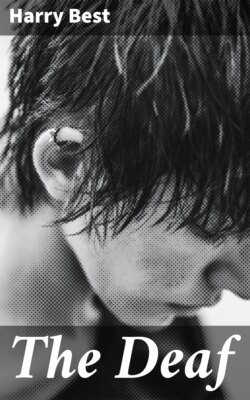Читать книгу The Deaf - Harry Best - Страница 3
На сайте Литреса книга снята с продажи.
FOREWORD
ОглавлениеTable of Contents
The aim of the present study is to ascertain as far as possible the standing of the deaf, or, as they are so often called, the "deaf and dumb," in society in America, and to examine the treatment that has been accorded to them—to present an account of an element of the population of whom little is generally known. In this effort regard is had not only to the interests of the deaf themselves, but also, with the growing concern in social problems, to the fixing of a status for them in the domain of the social sciences. In other words, the design may be said to be to set forth respecting the deaf something of what the social economist terms a "survey," or, as it may more popularly be described, to tell "the story of 'the deaf and dumb.'"
The material employed in the preparation of the work has been collected from various documents, and from not a little personal correspondence: from the reports and other publications of schools for the deaf, of organizations interested in the deaf, of state charities, education or other departments, of the United States bureaus of education and of the census; from the proceedings of bodies interested in the education of the deaf, of organizations composed of the deaf, of state and national conferences of charities and corrections; from the statutes of the several states; and from similar publications. From the American Annals of the Deaf the writer has drawn unsparingly, and to it a very considerable debt is owed. Valuable assistance has also been obtained from the Volta Review, formerly the Association Review, and from papers published by the deaf or in schools for the deaf. Other sources of information used will be noted from time to time in the work itself.
For all that has been set down the writer is alone responsible. He is, however, keenly mindful of all the co-operation that has been given him, and it would be most pleasant if it were possible to relate by name those who have been of aid. Mere words of thanks could but very little express the sense of obligation that is felt towards all of these. Indeed, one of the most delightful features connected with the work has been the response which as a rule has been elicited by the writer's inquiries; and in some cases so courteous and gracious have been the correspondents and informants that one might at times think that a favor were being done them in the making of the request. To certain ones the writer cannot escape mentioning his appreciation: to Dr. E. A. Fay, editor of the American Annals of the Deaf, and vice-president of Gallaudet College; Dr. J. R. Dobyns, of the Mississippi School, and secretary of the Convention of American Instructors of the Deaf; Mr. Fred Deland, of the Volta Bureau; Mr. E. A. Hodgson, editor of the Deaf-Mutes' Journal; Mr. E. H. Currier, of the New York Institution, and Dr. T. F. Fox and Mr. Ignatius Bjorlee, also of this institution; Dr. Joseph A. Hill, of the Census Bureau; Mr. Alexander Johnson, formerly secretary of the National Conference of Charities and Corrections; Dr. H. H. Hart, of the Russell Sage Foundation; Professor S. M. Lindsay and Dr. E. S. Whitin, of Columbia University; and to the officials of the Library of Congress, of the New York Public Library, of the New York State Library, of the New York School of Philanthropy Library, of the New York Academy of Medicine, of the Columbia University Library, of the Volta Bureau, and of the Gallaudet College Library.
